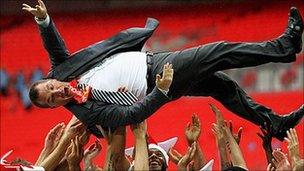Tony Petty era 'galvanised' Swansea's rise to Premier
- Published

Tony Petty bought Swansea City for £1 in 2001
Some Swansea City fans may find it hard to agree, but with the benefit of hindsight, Tony Petty was arguably the best thing to have happened to the club.
His turbulent three-month tenure at the end of 2001 almost saw the then League Two side go out of business.
But the Australian-based businessman's handling of the club brought supporters together to fight to reclaim their club.
Fans took to the streets in protest against Petty's running of the club as he attempted to sack seven players and two coaches to cut costs, which the Professional Footballers' Association thwarted.
A local consortium of supporters, headed by former director Mel Nurse, later battled to gain control of the club, and on 24 January, 2002 - reportedly 24 hours before the club was set to go out of business - they ousted Petty.
It was by no means a smooth start for the new owners, who had to keep the club afloat and in the Football League, narrowly avoiding the drop on the last day of the 2002/03 season.
But since then, the club has not looked back and on Monday they begin life as the first Welsh club in the Premier League after beating Reading 4-2 at Wembley in May's Championship play-off final, a game said to be worth £90m.
'Galvanised'
"At the time Tony Petty was not the best thing to happen to the club, but looking back what happened galvanised the football club," said Phil Sumbler, chairman of Swansea City Supporters' Trust.
"Tony Petty came in and took the football club to the brink and everybody woke up and realised there's a football club that we were in danger of losing.
"Everyone rallied together, took to the streets, protested, and while it took a sum of money to get Tony Petty out of Swansea, all the supporters played their part."
Supporters still play their part in a major way today as the Swans are also the first Premier League club where the fans have a significant ownership.
The supporters' trust, which was set up in 2001 before Petty's arrival, has a 19.9% share in the club - the third largest shareholder - and a director on the club's board.
So as well as climbing through the leagues and winning friends from outside with their attractive brand of football, Mr Sumbler believes many clubs can learn from Swansea's way of running a football club.
'Role model'
"We are now seen as a club that is a role model to others having built on the foundations from nowhere," he added.

Swansea players celebrate winning promotion by throwing manager Brendan Rodgers in the air
"The harsh lessons learnt from those dark days continue to influence the way the club is run and financial prudence remains a key factor in the day to day decision making.
"However, money which the club could not even dream about in 2001 is now being paid out to retain and acquire players capable of meeting the huge challenges ahead.
"As the Swansea City players walk out alongside the multi-million pound stars of Manchester City at the Etihad Stadium, they know that they have earned the right to be there.
"For many of the Swansea City fans sitting in the stands or watching as part of a global TV audience, they too will look on with pride knowing the huge part they have played in the success story that is Swansea City."
- Published30 May 2011
- Published27 May 2011
- Published18 May 2011